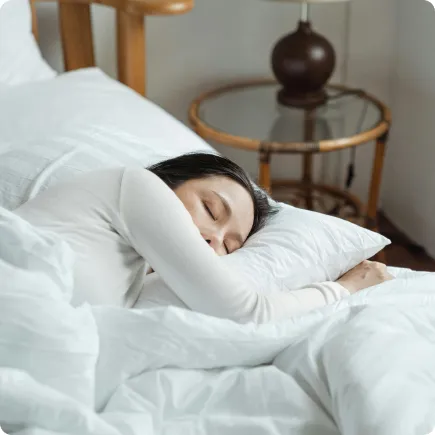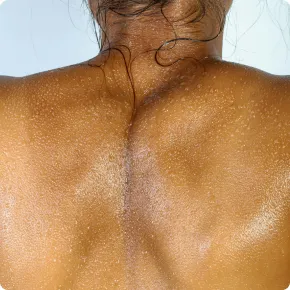
Menopause Night Sweats

What are menopause night sweats?
Night sweats are sudden waves of extreme heat in your body that cause you to sweat profusely. You can also think of night sweats as hot flashes at night—and the reason you may be feeling like you ran a marathon (or two) in your bed.
What’s causing your night sweats during menopause?
Night sweats are caused by the fluctuation and decline of your hormones, mainly attributed to estrogen.
Certain factors can worsen them, including stress, smoking, and being overweight. A one-off night sweat episode can be triggered by external factors like caffeine, alcohol, spicy foods, exercise before bedtime, stress, heavy blankets while sleeping, tight clothing, or a warm temperature room. Pretty much anything that can heighten your internal temperature—sheesh!
of Members report symptom improvement within 3 months.
care at your fingertips.

What is going on inside your body?
Usually, when your body gets too warm, the hypothalamus (the part of your brain that modulates body temperature) will signal your blood vessels to open up to release heat. This causes blood to flow more quickly to your face, neck, and chest, making your sweat glands open and your heart pump faster.
Lower estrogen levels will cause your hypothalamus to set off this sweat-fest at random, which is why you may be wide awake in the middle of the night with clothes and sheets clinging to your body.
What are some medical-provider-prescribed treatments for menopause night sweats?
Estradiol: This is the most effective and safe treatment available. It is both natural and FDA-approved. It is scientifically proven to eliminate night sweats in up to 75% of women. Estradiol replenishes the exact form of estrogen that your ovaries are no longer producing.
Paroxetine: This FDA-approved SSRI (selective serotonin reuptake inhibitor), may be prescribed for women who aren’t candidates for estrogen or do not want to take estrogen. Paroxetine increases the level of serotonin within your brain.
Venlafaxine: An SNRI (serotonin-norepinephrine reuptake inhibitor) may be prescribed for women who aren’t candidates for estrogen therapy or do not want to take estrogen. Venlafaxine increases the levels of serotonin and norepinephrine levels in your brain.
Gabapentin: This is a seizure medication that can act as a mechanism to help control body temperature.
Clonidine: This high blood pressure medication treats hot flashes by lowering blood pressure.
of Members report symptom improvement within 3 months.
care at your fingertips.

What are some non-medical treatments for menopausal night sweats you can do at home?
While less effective than medical-grade treatments, here are some of our go-to at-home supplements that can be used on their own:
Cool sleep environment: Set your bedroom temperature between 60 and 68º F, invest in a cooling mattress or pillow, use sheets with breathable material (like cotton or linen), run a bedside fan, and keep a glass of cold water on your nightstand.
Nutrition: Phytoestrogens foods (such as yams, flax, and lentils) can mimic estrogen within your body—these foods can elevate your estrogen levels and support you against night sweets.
Supplements: Black cohosh, vitamin E, and dong quai can help reduce night sweats. However, medical studies are inconclusive. Vitamins B6 and 12 can occasionally help with anxiety related to night sweats.
Breathing exercises: Deep breathing exercises and mindful meditation can assist in calming anxiety and reducing heart rate and blood flow.
Daily exercise: Consistent physical exercise can help your body regulate temperature and release heat.
How are your menopause night sweats diagnosed?
Once you are paired with your provider, they will diagnose you based on the description of your symptoms.
What should you do next?
Let’s get you prepared to be paired with your provider!
Select and submit all of the symptoms you are currently experiencing so your doctor can assess and provide a tailored treatment plan for you.
of Members report symptom improvement within 3 months.
care at your fingertips.

References
- A recent analysis of the Study of Women’s Health Across the Nation (SWAN) found that vasomotor symptoms—like night sweats—typically last between five and thirteen years. On a zero (meaning none) to three (meaning severe) scale, most women rated them moderate to severe.
- A 2006 analysis of SWAN looked at vasomotor symptoms by ethnicity and determined that African American women experience them the most often, while Asian women got them less frequently.
- Another 2006 study found a correlation among night sweats, depression, sleep disturbances, and diminished libido in perimenopausal and early postmenopausal women.



